Welcome back to Chess in Small Doses, a Substack for adult improvers in chess. After a nice summer break, I’m back at it. Today I’d like to talk about playing offense and playing defense. Let’s get into it.
As the summer rolls on in the US, the clock counts down to when football starts again. In the US, football is king among sports. It’s the top grossing sport, and even at the college ranks it’s a multi million dollar industry. If you’re a football fan like I am, you couldn’t have missed the news that Bill Belicheck, the greatest professional football coach of all time (and a little controversial) was hired by the University of North Carolina (bit of a head scratcher really). Of course that’s not the only news he’s made, but ok we’ll just leave that there. He was known for a style of football that emphasized defense and fundamentals over offense. This is called “old school” football, and while it doesn’t make for fun viewing it often wins. More accurately, I should say it often doesn’t lose which is very different (Iowa football fans I’m looking at you).
Stats show that in football, turnovers are highly correlated with losses. The more opportunities you give your opponent with the ball, the more likely they are to outscore you. You’ll find a very similar story in baseball, another sport I enjoy. “Pitching and defense” is a mantra many coaches will espouse even though people, media, and the League prefer offense. Like football, it’s hard to overcome mistakes from your own team. Good teams in both sports work hard to reduce their own errors and play solid defense. There’s an old quote that “offense sells tickets, but defense wins championships.”
Agree or disagree, the idea stuck among “old school” coaches in many sports. One thing that has always struck me as odd is that “old school” coaches don’t really emphasize that in chess. While Steinitz created some rules that essentially said not to attack until you have the advantage, the Soviet School of Chess came to emphasize dynamics and an attacking style (notable exceptions of course) that ushered out “old way”. The Soviet School took advantage of the fact that it is much easier to play offense than defense. My experience shows that to be true, but I’ve just never understood why that should be in chess.
In sports, defense is often characterized as a byproduct of “heart” or a willingness to do the “dirty work” to help the team. Is defense in chess just a matter of “wanting it” more than the other player? I’m not sure but I think that defense is an approach, a focus, a mindset. It is also the hardest skill to learn in chess for me.
Real or Ghosts?
Take a look here at this position, where it’s Black to move. What would you play as Black?
If you said 1…f6, that was my first thought. However, I noticed that after f6 then 2.Ncx4 and if Black plays 2…bxc4 the e6 pawn hangs. I suppose you could play 2…Bxf4 instead but White can play 3.Ncd2 and probably just fine or even better. So I out thought myself here and played instead 1..Re8?? missing the latent threat in the position (which my opponent saw) of 2.Ng5! After that 2..g6 is forced allowing 3.Ngxf7. Arrrggghhhh
I talked myself into the presence of a threat that wasn’t really there . It’s called “seeing ghosts” which happens to me often. Even worse, I completely missed the actual threat in the position (that also happens to me often). Best move for Black is the simple h6, cutting off the knights access to g5.
Playing defense in sports is about awareness, thinking ahead, being prepared, and playing with energy and will. I want to say that same thing for chess, but I’m not sure that’s 100% true. Playing defense in chess is actually a commitment to first and always look at what can your opponent do next. In the old Soviet School, there was a lot of emphasis on “prophylaxis” or anticipating your opponent's ideas and eliminating them if possible. So why is that so damn hard for amateurs to do?
The Problem of Puzzles
Well for one reason we’re set up for it. In most sports there is a clear separation between offense and defense. Basketball, football, soccer, baseball, racing, cricket, and any sport you can think of… defense and offense are distinct from each other. Not so in chess. We’re playing defense and offense at the same time. What we are not doing, however, is training for both. Below is my Lichess Puzzle rating for different puzzle types. See any opportunities for improvement?
Lichess tells me I am roughly performing at a 2100 level… except for when I have to play defense where I am 1800. Consequently I am an 1800-1900 player on Lichess. Most tactics trainers and puzzle resources are decidedly one sided, focusing on offense. It is uncommon to find any defensive puzzles in tactics books, and even more uncommon to find books dedicated to defense. I cannot tell you how many “White to move and win” tactics I’ve done. But defensive ones? Those are hard to find.
Under stress we default to our training. The net result of doing all these one sided puzzles is that my vision is trained on what I can do, not exactly what my opponent can do. This is like trying to learn how to listen better by practicing talking. Sure I could make it a mental check to really look for threats, but every time I have to remember to remember I am vulnerable to forgetting. Also remembering to remember takes brain power which is often fully committed when calculating variations. If we don’t train for it, it’s probably not going to happen
Old School Advice
However hard to find they are, there are defensive resources. Susan Polgar has an entire book in her beginner oriented Learn Chess the Right Way series on defense. The book 1001 Puzzles for Club Players has an entire chapter on defense. GM Johan Hellsten is coming out with a new book called Mastering Chess Defense (and was recently featured on Perpetual Chess) and there are books written on defense in general. The one resource I’ve chosen for myself is a Chessable course from FM Dalton Perrine called Survive & Thrive: How to Blunder Less and Defend Better. It’s well done and is aimed at my level or above. The point is there are defensive resources if you want to find them.
Of course there’s another old quote: “You can lead a horse to water but you can’t make it drink.” Defense is not sexy, offense is. Defending well isn’t as exciting as a three move check mate, or an amazing knight fork. It feels like (at least for me) that playing defense is like giving in to the other players initiative. I’m not alone there. In the book The Lasker Method to Improve in Chess, there is an entire chapter on defense that notes this:
“Many players defend poorly in the first instance because they are reluctant to admit that they have gone wrong and stand worse, and need to adopt the role of defender. As a result, they shut their minds to the reality and play as if they stand well and have the initiative.”
I don’t know about you but that rings true for me. I don’t want it to be true that I am defending. Chess is after all a fight between two sides. In that fight, I want to win and am always looking for a weakness I can exploit. For some reason, it is difficult to shift mindsets and look to see what weaknesses I am creating. But here’s where the old school advice becomes useful.
Playing games and analyzing is the easiest way to see where you are creating opportunities for your opponents. It’s like watching film in football, you review what you actually did. Over time you get an understanding of what are common strengths and weaknesses for you. Playing and analyzing is of course the oldest of old school advice. The problem is to get better this way, you have to be willing to suck, and then look back at exactly how badly you sucked. I think this is the “heart” required to learn to play defense, the commitment necessary. We have to be willing to admit where we are weakest, and then commit to put in the work needed to improve. Maybe playing defense in chess is not unlike any other sport in the end. We may all have the will to win, but only a few of us have the will to prepare.
Knowing vs Doing
A weakness, if accepted and worked on, can become a strength. Conversely a strength, when relied upon, becomes a weakness. I know my strengths are openings and tactics. I know my weaknesses are defense and calculation. Being an adult with limited time I’m not sure what to do to improve those things. Most of my training is admittedly reinforcing my strengths. I know what I need to do, but can I bring myself to actually doing it? Take this position from one of my games for example, Black to move after White played 1.g5?
In a position like this, it would be good for me to train how to sit and think through the position for 10 minutes. That kind of training would help me get better at calculation when there isn’t an immediate tactic. But what do I do? Well the honest answer is blitz. I’d be tempted to play blitz because it’s fun.
I don’t think I’m alone here. I suspect I’m in the wide majority of players who are probably good at tactics and probably good at openings, but need to work on their stamina and tolerance for thinking through positions. At least now that I am aware and know what to do.
In the end, playing good defense in my opinion is a commitment to working on where we are weakest. Maybe that’s the psychology, maybe it’s the calculation, or maybe it’s analyzing games. Whatever it is, defense in chess is a vital skill that is a challenge for every player. It is also difficult to learn (at least for me) because it isn’t as fun or easy as offense. As I said in the beginning, offense sells tickets but defense wins championships.
Thank you for reading! I have enjoyed writing and growing the audience. Recently this Substack passed 1000 subscribers so let me say thank you to all of you. I am humbled and hope to keep writing interesting stuff. Thank you all for your support. Until next time, good luck with your chess!




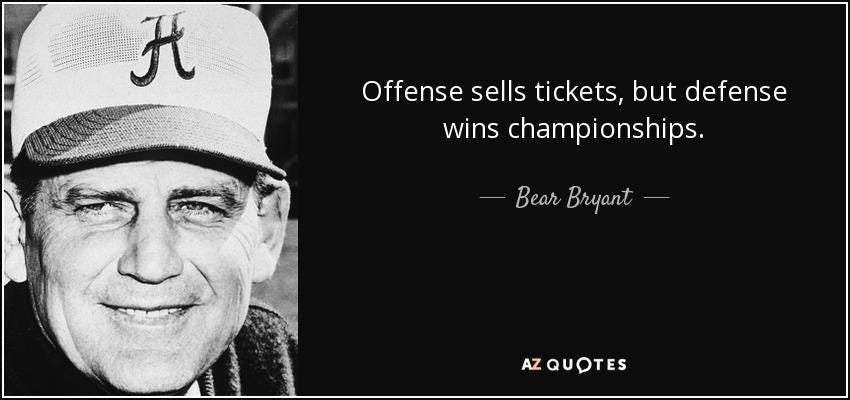
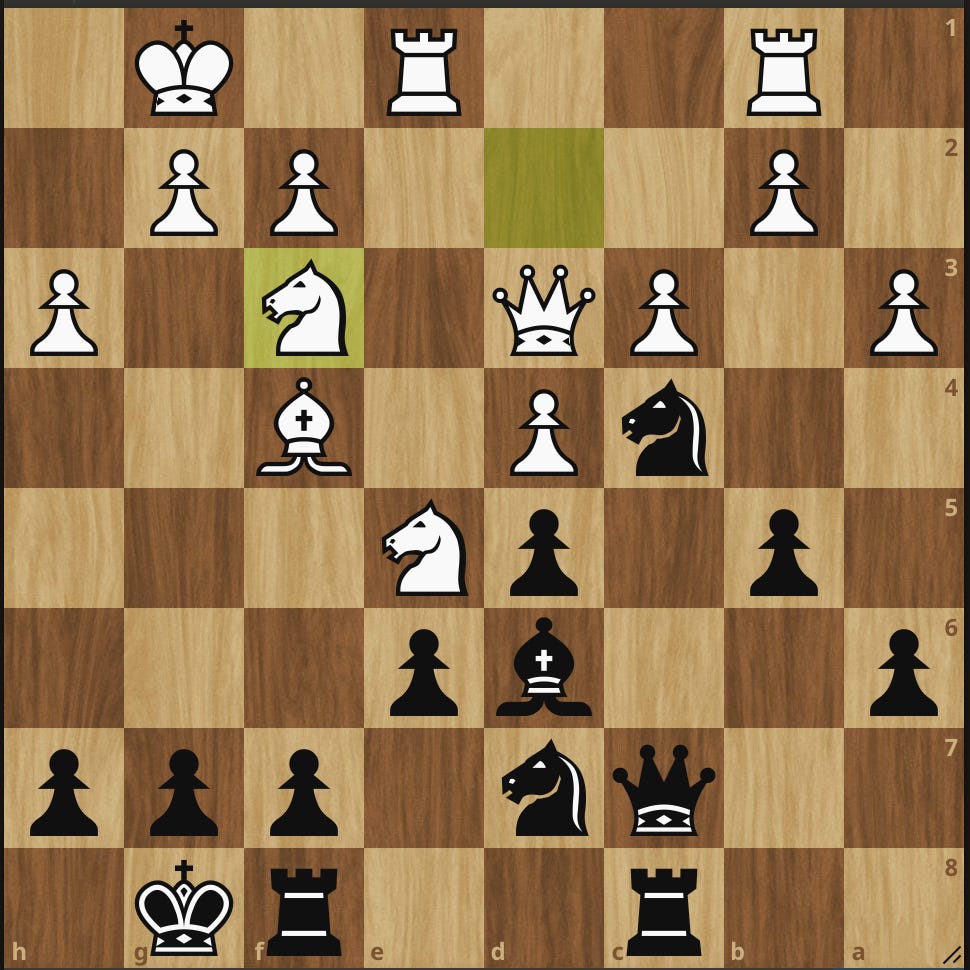
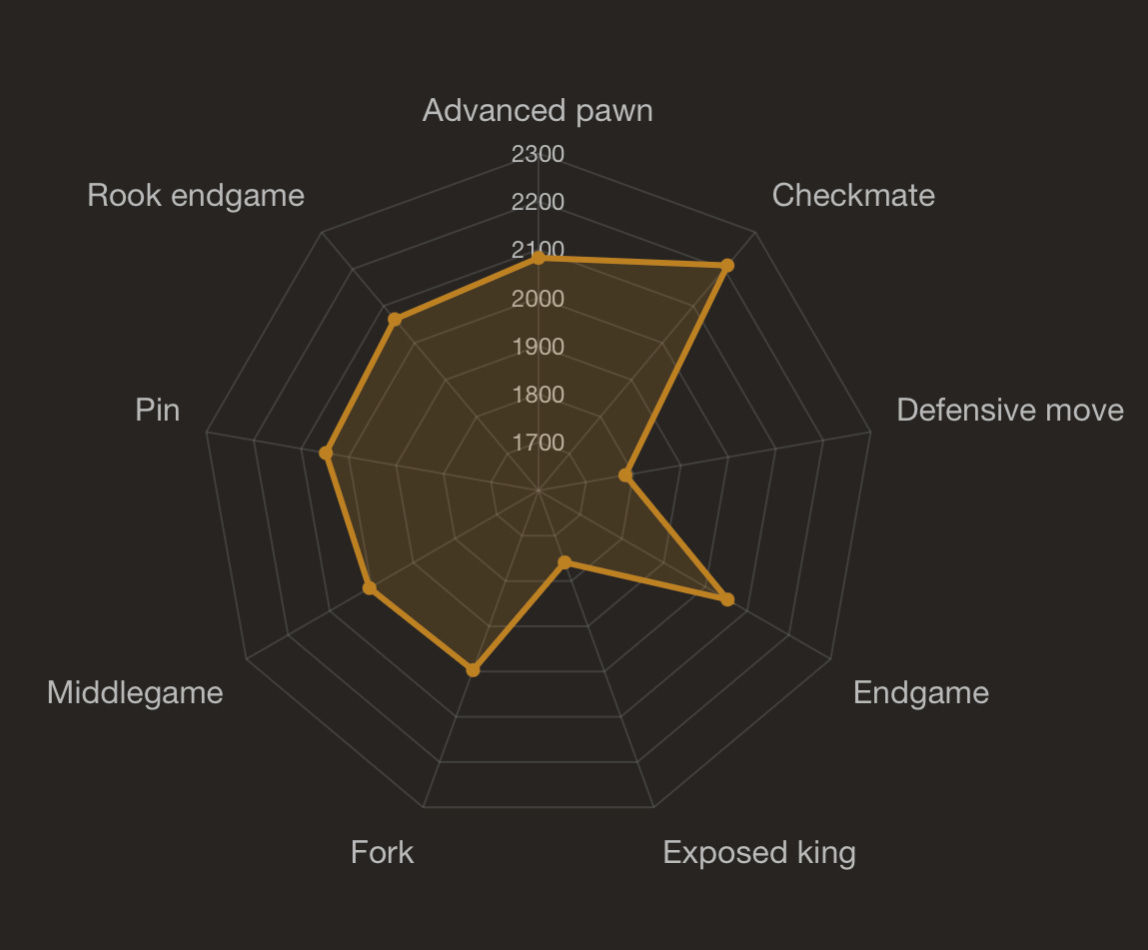
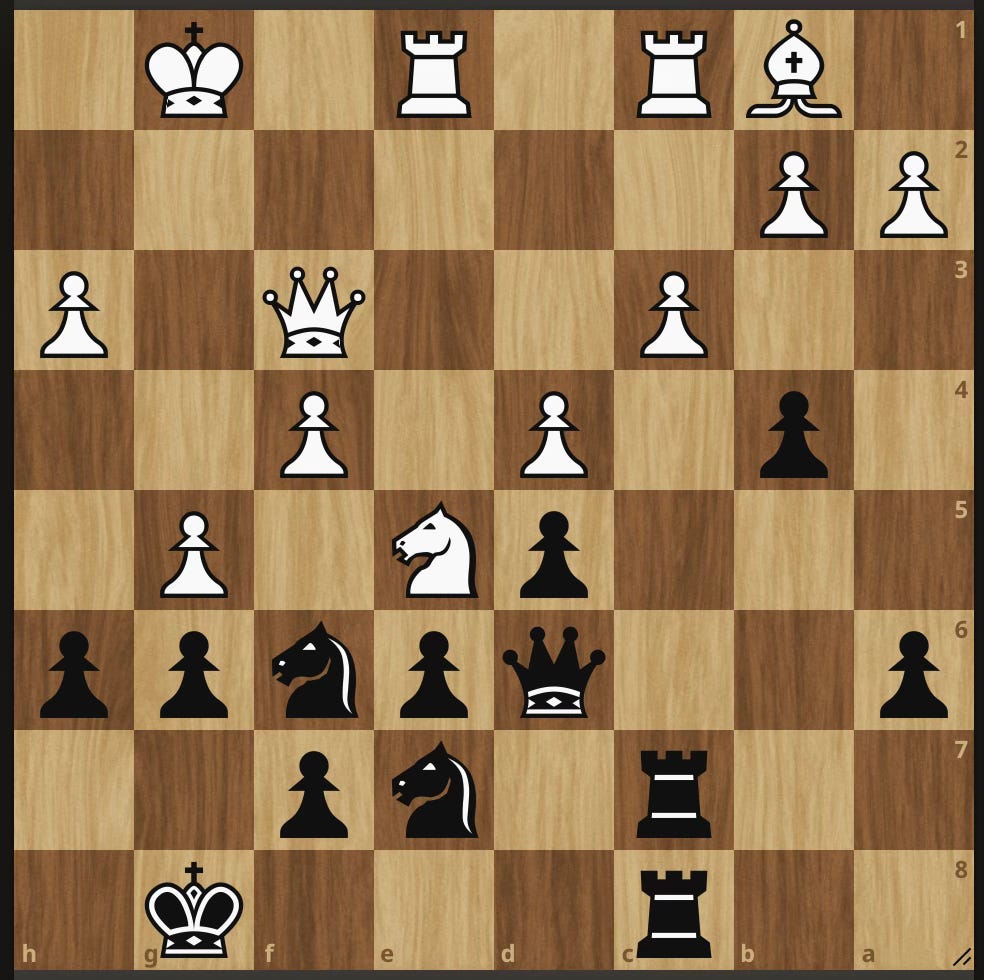
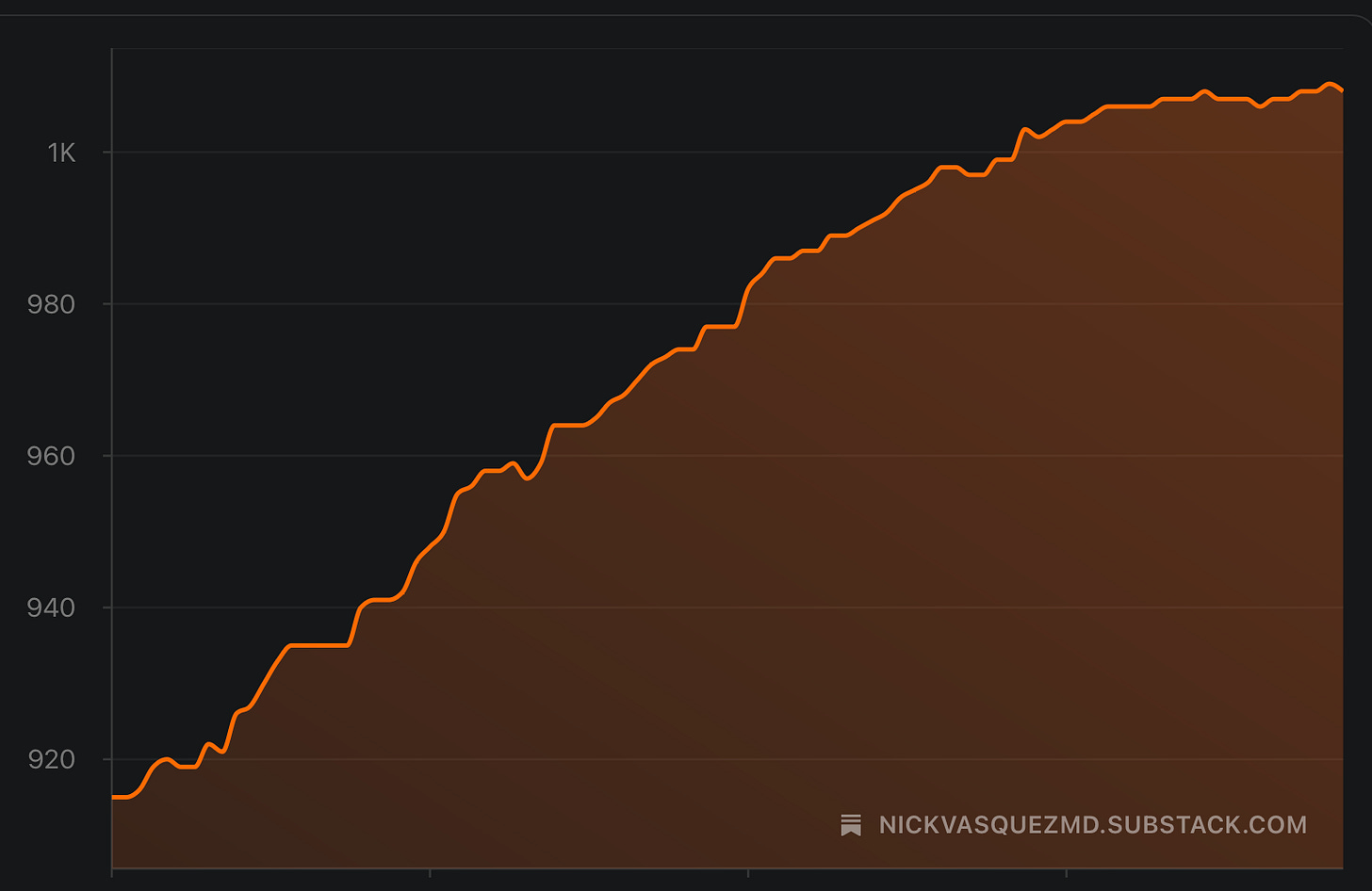
As a good paranoid who thinks everyone uses an engine in the Lichess Tournament per hour, I discovered that the best way, in my supposed hyper-super-defensive theory, would be to start by hunting the knights because the engines know how to use them divinely and it is very difficult for a human to calculate several moves ahead, then the bishops and, obviously, in the meantime, force an exchange of queens. In the end, I am left with rooks and pawns, a frustrating victory for my opponent.
I tend to feel much more engaged with the game and interested in calculating variations when I'm attacking - there's something about looking for winning tactics that's much more compelling than trying to find the best way to consolidate after winning material.
Your point about seeing ghosts when defending is an important one. It's so easy to trick ourselves into playing strange moves that we would never consider if we weren't worried about our opponent's treats. That's why I think one of the most important principles of defensive play is to prioritize moves that continue to follow logical principles: keeping the pieces defended to avoid tactics, maintaining flexibility, etc.